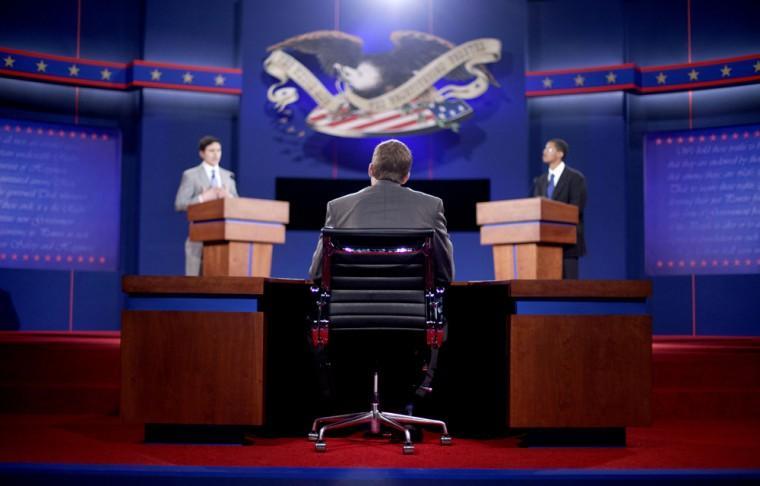At least two voices will be missing from Wednesday’s presidential debate.
Green Party candidate Jill Stein and Libertarian Party candidate Gary Johnson are the two strongest third party contenders in the presidential race, but they’re being blocked from participating in the debates by a private commission largely influenced by Republicans and Democrats.
The Commission on Presidential Debates (CPD) is a nonprofit corporation that has sponsored every presidential and vice presidential debate since 1988.
It stepped in to replace the League of Women Voters (LWV) after the LWV withdrew its sponsorship of the debates when candidates George H.W. Bush and Michael Dukakis secretly drafted a “memorandum of understanding” dictating debate terms.
Founded by then-Republican National Committee Chairman Frank Fahrenkopf and then-Democratic National Committee Chairman Paul Kirk, Jr., in 1987, the CPD has allowed the major parties to manage presidential debates for the last 24 years.
Its seeming collusion with Republican and Democratic interests has put third parties at a disadvantage.
“It’s Republicans and Democrats that have no interest whatsoever in seeing a third party on stage,” Johnson said before taking the stage in the Union Theater last Friday.
The CPD’s rule that candidates must reach 15 percent in national polls creates a type of self-fulfilling prophecy. By denying third parties access to the debates, third party candidates, who already receive scant media coverage, are blocked from reaching out to voters on a national stage.
“Do you hear my name five times every time Obama are Romney are mentioned 100 times?” Johnson asked the Union Theater audience.
One only needs to revisit Ross Perot’s 1992 campaign as an independent to see what the national spotlight can do for a third party campaign.
Before the presidential debates, Perot was polling at around 7 percent, similar to Johnson’s polling today of around 6 percent. After Perot was granted access to the debates, he soared to 35 percent in the polls and ended up gaining 19 percent of the vote, according to Gallup.
No third party candidate has been allowed in the presidential debates since.
But that hasn’t stopped third party candidates from trying.
Johnson recently sued the CPD, claiming the commission violates anti-trust laws and alleging it conspires to block third parties from the debates. Stein will be marching with demonstrators in Denver on Wednesday to protest the CPD’s exclusion of third party candidates in an event called Occupy the Debates.
Other organizations are also beginning to call out the CPD.
Two sponsors, multinational corporation Philips Electronics and women’s organization Young Women’s Christian Association, have already pulled support from debates over Johnson’s absence.
Eighteen other pro-democracy groups, from Rock the Vote to Fairness and Accuracy in Reporting, have called on the CPD to make public the debate contract negotiated between the Obama and Romney campaigns.
Third parties already have difficulties just getting on the ballots in most states. Creating more barriers, even when candidates are on enough ballots to theoretically gain an electoral majority, limits the choices available for voters.
Right now, 46 percent of Americans believe a third party is needed — a number admittedly down from 55 percent late last year — according to a Gallup poll released in September. A Washington Times and JZ Analytics poll released earlier this year similarly found that 40 percent of Americans did not feel their views were represented by either major party.
This large group of Americans is forced to choose between the lesser of two evils every four years because of the disadvantages placed on third parties by our electoral system.
By excluding these candidates, we are sacrificing the chance to hear dissenting opinions on the underlying assumptions and policies shared by the major party candidates.
These are the debates for presidency of the United States.
They should be open, and they should be inclusive.
A broad conversation is needed in this country in order to maintain healthy, functioning democracy.





